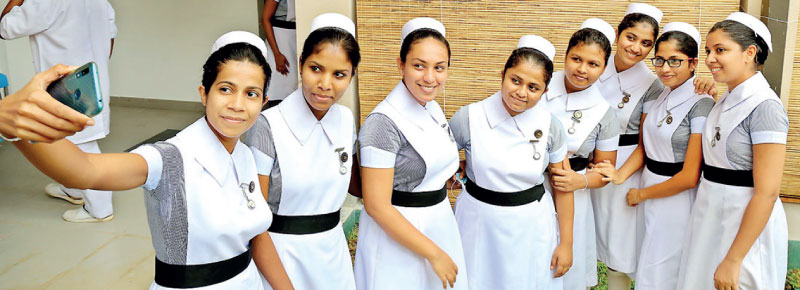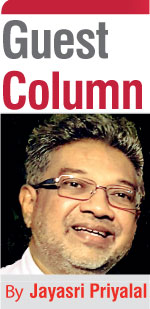Monday Feb 16, 2026
Monday Feb 16, 2026
Friday, 13 January 2023 00:20 - - {{hitsCtrl.values.hits}}

Managing individual talents to spot opportunities for aspiring people to secure livelihood is crucial
 How many of us can predict continuing to hold the job that we do currently into the future? That is the challenge many policyholders are forced to address to develop strategies to stimulate the stalled economies to grow sustainably. The concept of a job is disappearing as there is an increasing trend of atomisation of work processes with technological infiltration. As such, job security is fading away, and the employability of human talent is gaining prominence.
How many of us can predict continuing to hold the job that we do currently into the future? That is the challenge many policyholders are forced to address to develop strategies to stimulate the stalled economies to grow sustainably. The concept of a job is disappearing as there is an increasing trend of atomisation of work processes with technological infiltration. As such, job security is fading away, and the employability of human talent is gaining prominence.
The keyword that triggers the thought process building up the arguments in this article is “Jobs”. In Sinhala, the meaning of job /lshdj holds a variety of interpretations leading to a secured position in the community and society. The question that dominates in the new world of work is whether the concept of a job will remain to provide security for the life course of the holder. Are we now getting used to finding only work for a living? Still, there is work to be done for the shared prosperity of all.
The policymakers, either elected or selected, are desperate to hold on to their jobs even though they have no popular mandate from the people to govern. The Executive President elected by the people got chased out on 9 July 2022, and the Prime Minister resigned over public anger on 9 May 2022. That is, history and facts, and the dramas unfolding after that are not the subject matter of this essay, yet they add dire consequences. They have a job to do, but many others have no jobs to survive hence forced to migrate.
Over 200,000 Sri Lankans with various skills and competencies left the island between February and September 2022. Prevailing uncertainties in the country have pushed many helpless and hopeless. As reported in the media, the competent authority who issues passports in Sri Lanka works 24X7 to meet the increasing demand for the issuance of travel documents. Those with means and good connections are trying to leave the country for any given opportunity as their frustrations have reached the boiling point.
Evolving technology has impacted human civilisation – from fire to improvised tools to steam engines to the modern Internet. Technology frees up talent to deploy creative problem-solving and solution-building in businesses. Human society is a collection of the contribution of labour in terms of mental and manual skills. Work and job entrepreneurship are the essential building blocks in communities.
Pandemics are turning points in human civilisation
In-depth analysis and historical trends reveal that global pandemics such as COVID-19 have left remarkable turning points in work and labour-related social and economic conditions.
A marketplace for labour and payment of wages for work emerged after the Bubonic plague, or the Black Death hit the feudal European territories in the mid-14th century (1352). The plague killed almost half of the population. Landlords’ feudal masters lost millions of serfs. They had to find labour-human power – by paying wages, adding value to economic activities, and securing a dignified life for millions of wage earners. The Black Death ended serfdom in Europe; the bubonic plague was a turning point in civilisation.
Again, in the early 20th century, another pandemic known as the Spanish flu further changed the lives of wage earners. The organised labour movement was concerned about the work-life balance, freedom, welfare, health, and wellbeing of those selling labour around the clock. At the end of WWI, in 1919, the International Labour Organization prescribed the critical eight hours of work as its first convention, which is still applicable in setting standards for compensation for those holding a job. The minimum age to start work, limiting night work for the young, and maternity protection for women became norms after that for the good of society.
The COVID-19 pandemic in the 21st century sets new standards in the new world of work. Digital technological platforms are the work-centred ecosystems enabling remote work practices. There are many contributory factors for this development; one is the exponential growth of advanced digital technology, high-speed Internet and SMART tools and APS.
Remote work practices and flexi/hybrid work systems will further challenge the traditional job concept. The fast Internet of things, equipped with Artificial Intelligence and Machine Learning abilities, will limit a wage earner to find work for uninterrupted eight hours. Many will switch between parallel careers, lifelong learning, and working. The demographic shift and advances in medical science enable people to live long. Hence managing the ageing population adds further challenges. Eldercare and geriatrics are expanding as different industries worldwide.
In line with the new trend, productivity measurement indicators and skills and competencies upgrading systems need to be re-invented to suit the current techno-culture. The rapid pace of digital disruptions impacts every economic sector demanding new social security and protections. A global coalition seeking a new social justice is necessary, emphasised Gilbert Houngbo, Director General of ILO, at the recently concluded 17th Asia & Pacific Regional Meeting in Singapore.
Migration in search of livelihood
Migration is the natural response when many challenges compel change in humans and other living beings throughout human civilisation. Managing individual talents to spot opportunities for aspiring people to secure livelihood is crucial. Various diplomatic missions need to network with industry stakeholders to study the trends of emerging overseas job markets.
Many Sri Lankan diplomatic missions overseas had only been working to find job opportunities for the kith and kin of the politicians in power. However, few diplomats are going all out to help Sri Lankans find job opportunities to strengthen their livelihood and employability and earn some foreign exchange for the country at this critical juncture. They deserve due credit and appreciation.
Human Resource needs in Lion City Singapore
Lion state, Sri Lanka, then Ceylon had been supplying expertise, professional know-how, and workforce to the development of Singapore, the Lion City, from WW II. Troops of the Ceylon Pioneer Corps soldiers were stationed in Singapore to rebuild the city-state following the destruction of the Japanese invasion in 1945. Since then, there has been a continuous flow of Sri Lankan talent-finding opportunities in Singapore.
One such career diplomat, Shashikala Premawardhana, the current High Commissioner, and her staff attached to the Sri Lankan High Commission in Singapore. She worked tirelessly to seek the necessary medical equipment and materials in short supply in Sri Lanka when the COVID-19 pandemic became a critical health challenge. She deserves our commendation for all such initiatives.
Moreover, the High Commission is now exploring job opportunities for skilled Sri Lankan workers in airport and aviation, hospitality, nursing, and shipbuilding. Singapore has very tight foreign labour recruitment policies. And many labour-supplying countries are competing to find entry to Singapore. The High Commission is working closely with the Singapore authorities to secure some quotas for Sri Lankans, particularly those in the skilled categories. The selfless work of Nipuna Thibbotumunuwa, a Counsellor of Employment Relations and Labour, deserves appreciation for his efforts to liaise with Singapore authorities to secure opportunities for Sri Lankans.
Unprofessional Mulleriyawa petition
The National University Hospital (NUH) group decided to recruit 120 nurses from Sri Lanka. The employment Relation Counselor of the High Commission accompanied a delegation of health professionals from Singapore who was satisfied and granted 120 nursing opportunities as an initial quota in consultation with health authorities in Sri Lanka. Last month, the first two nurses arrived in Singapore to work in the NUH group of hospitals. Surprisingly the Director of the Colombo East Base Hospital has written a letter to NUH and alleged that one of the nurses had secured the job opportunity by submitting forged documents.
The doctor from Mulleriyawa Base Hospital had acted more than his authority without following the protocol, not cautioning the Ministry of Health and the Ministry of Foreign Affairs on the alleged irregularity in Sri Lanka. The baseless allegation spoiled the opportunities for Sri Lankan nurses to cast doubts about their professional competence. The learned professional has crossed his line and made an unprofessional mess putting an end to his countrymen and women seeking overseas employment opportunities.
At the outbreak of the COVID pandemic, the Mulleriyawa hospital was in the news as many health professionals lacked the essential protective gear to treat the patients. This writer and many Sri Lankans living in Singapore mobilised resources to supply the urgent medical equipment enabling the frontline medical staff to carry out their duties safely. Many health sector trade unions have not timely secured the necessary arrangements to provide their members with essential occupational health and safety equipment. Instead, the trade union leaders were busy in politics aligning with their masters in king-making.
The irresponsible act of the doctor has watered down the efforts of the Sri Lankan High Commission officials in Singapore. One could only assume that the modus operandi of the Colombo East Base Hospital Director is pure professional jealousy preventing one of his colleagues from getting an overseas job opportunity. Such stupid activity creates a huge black mark for Sri Lanka, not only for the health sector but for other areas where the two governments have some understanding to support and provide employment for the deserving.
The tiny invisible virus taught all medical professionals the superiority of hierarchy is meaningless, as all of them must work as a team, ranging from a specialist to sanitary cleaners, for mutual protection and safety, thus helping patients recover from the illness soon.
Let us hope that the concerned authorities take appropriate disciplinary action on the irresponsible act of the Director of Colombo, East Base Hospital, clarify the doubts among the Singapore health officials, and secure the opportunities for many Sri Lankans overseas in the future.
Be mindful that those unable to cope with change will never initiate change. One study has revealed only archaeologists continue their jobs to the future. Many of us will be moving out of our comfort zones, as none of us individually will be greater than all of us.
(The writer is the Regional Director responsible for Finance Sector, working with UNI Global Union Asia and Pacific Regional Organization in Singapore; email [email protected].)